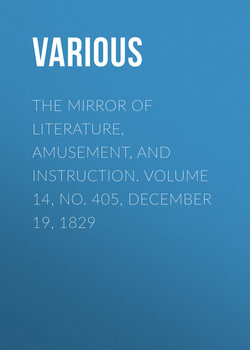Читать книгу The Mirror of Literature, Amusement, and Instruction. Volume 14, No. 405, December 19, 1829 - Various - Страница 4
NEW BUILDINGS, INNER TEMPLE
ON GARDENS. 2
Оглавление(For the Mirror.)
The hanging gardens, in antiquity called Pensiles Horti, were raised on arches by Nebuchadnezzar, King of Babylon, in order to gratify his wife, Amyctis, daughter of Astyages, King of Media. These gardens are supposed by Quintus Curtius to have been equal in height to the city, viz. 50 feet. They contained a square of 400 feet on every side, and were carried up into the air in several terraces laid one above another, and the ascent from terrace to terrace was by stairs 10 feet wide.
Among the Mexicans there are floating gardens, which are described by the Abbé Clavigero, as highly curious and interesting, so as to form a place of recreation and amusement. The abundant produce of these prolific gardens, are brought daily by the canal in numerous small vessels, at sun-rise, to the market-place of the capital to be sold. The plants thrive in these situations in an astonishing manner, the mud of the lake being extremely fertile and productive, without the aid of rain. Whenever the owners of these gardens are inclined to change their situations, they get into their little vessels, and by their own strength alone, or where that is not sufficient, by the assistance of others, they get them afloat, and tow them after them wherever they please.
Gardening was introduced into England from the Netherlands, from whence vegetables were imported till 1509. Fruits and flowers of sundry sorts before unknown, were brought into England in the reigns of Henry VII. and VIII. from about 1500 to 1578. Grapes were first planted at Blaxhall, in Suffolk, 1552. The ingenuity and fostering care of the people of England, have brought under their tribute all the vegetable creation.
Lord Bacon has truly observed, "A garden is the purest of all human pleasures," and no doubt he felt its influence, when he returned from the turmoil of a court and courts. Many of his writings were composed under the shade of the trees in Gray's Inn Gardens; he lived in a house facing the great gates, forming the entrance to the gardens, and Sir Fulke Greville, Lord Brook,3 frequently sent him "home-brewed beer." Epicurus, the patron of refined pleasure, fixed the seat of his enjoyment in a garden. Dr. Knox says, "In almost every description of the seats of the blessed, ideas of a garden seem to have predominated. The word paradise itself is synonymous with garden. The fields of Elysium, that sweet region of poesy, are adorned with all that imagination can conceive to be delightful. Some of the most pleasing passages of Milton are those in which he represents the happy pair engaged in cultivating their blissful abode. Poets have always been delighted with the beauties of a garden. Lucan is represented by Juvenal as reposing in his garden. Virgil's Georgies prove him to have been captivated with rural scenes; though to the surprise of his readers he has not assigned a book to the subject of a garden. But let not the rich suppose they have appropriated the pleasures of a garden. The possessor of an acre, or a smaller portion, may receive a real pleasure from observing the progress of vegetation, even in the plantation of culinary plants. A very limited tract properly attended to, will furnish ample employment for an individual, nor let it be thought a mean care; for the same hand that raised the cedar, formed the hyssop on the wall."
P.T.W.
3
In the street called Brook Street, was Brook House.
